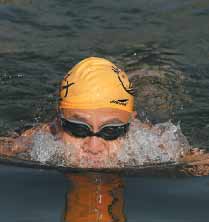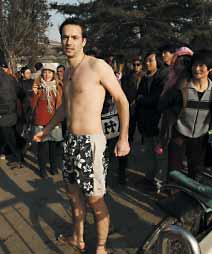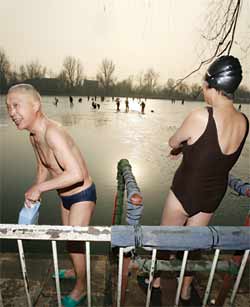Beijings winter is cold in the eye-watering, cheek-tightening, nose-running sense of the word. And yet, every year dozens of barmy Beijingers brave the big freeze to strip off and swim in the icy waters of the citys lakes and outdoor pools.

It is estimated that about 10,000 Beijingers swim outdoors every winter, and most of them are elderly. |
Seventy-year-old Guo Futang, who has 35 years of winter swimming experience, goes to the outdoor swimming pool at Tsinghua University at 10:30 am nearly every morning. He locks his bicycle next to the pool, takes off his clothes, except for his swimming trunks and starts warming up. Guo said he feels uncomfortable if he misses his daily swim, and even takes cold-water showers at home if he cant get out for a dip.
"It is cold, but once you are used to the water temperature, your body begins to warm up. Your bones and joints are extended and you get a great feeling of relaxation," he said.
Guo is typical of Chinas winter swimmers: fervently devoted, and a firm believer in the health benefits of jumping into icy water.
Swimming during the winter is a tradition for many elderly Beijingers who head to places like Tsinghua University, Yuyuantan Park and Shichahai Lake to take a dip. 
Li Lin, director of the Beijing Winter Swimmers Association, said there are more than 300,000 winter swimming fans in China, 3,200 of them are registered with his association.
There are thousands more who have not registered. It is estimated that about 10,000 Beijingers swim outdoors every winter, and most of them are elderly. The oldest known Beijing winter swimmer is 89 years old and the youngest 11.
Li himself has over 20 years winter swimming experience. "Its definitely good for peoples health. It improves circulation and can aid certain ailments. But you have to be careful if you have a cardiovascular condition," said the 43-year-old.
 Those who spend years of swimming in near freezing water enjoy more than just physical benefits. "It puts us in good spirits. Everything in life becomes less difficult, as nothings as hard as winter swimming," Li said.
Those who spend years of swimming in near freezing water enjoy more than just physical benefits. "It puts us in good spirits. Everything in life becomes less difficult, as nothings as hard as winter swimming," Li said.
Although there is a large number of winter swimmers, there are relatively few places where they can enjoy an outdoor dip. A few years back the city government passed a law prohibiting outdoor swimming in "non-swimming areas." These areas include nearly every park where Beijingers do their swimming, including Houhai.
In response to the new laws, the Beijing Winter Swim Club has called on the municipality to provide a few designated spots for legal winter swimming. The club hopes that such designated spots might have better facilities, such as changing rooms, and hopefully cleaner water. The authorities have yet to respond, but in the meantime swimmers are still flocking to the lakes such as Houhai, Yuyuantan, and Kunming Lake.
On January 6, the 28th Beijing Winter Swimming Performance Contest was held in Yanqing County. There are only two or three dates a year when Beijings winter swimming groups can legally swim in public lakes.
China has no laws or regulations to standardize winter swimming. In some areas, local policies restrict swimming in public bodies of water out of consideration for the environment.
Zhang Jian, director of the Outdoor Sports Center of Beijing Sports University, is in charge of promoting outdoor water sports in the capital. According to Zhang, who once swam across the English Channel, mens and womens 10-kilometer open water swimming will be added to the Beijing 2008 Olympic Games as a formal event. This will play a decisive role in promoting winter swimming.
(China Daily 01/18/2007 page4)
Taking the chilly challenge
By Tom Mackenzie(China Daily)
Updated: 2007-01-19 09:02
There are moments in life when peer pressure becomes an absolute necessity. Standing stripped to my Bermuda shorts, and faced with the challenge of plunging into an ice-covered Houhai Lake was one of them. If it hadnt been for the shouts of "one, two, three" from the dauntingly large crowd behind me, I would have backed out.
After jumping in, I wished I had. There were a good few seconds when I struggled to breathe, floating neck deep in 3 C water.
The water was colder than anything Id ever experienced by a long shot.
Id braced myself for the shock, the sudden breath and, (theres no way of putting this less crudely), the shrinking of my manhood to near peanut proportions. But this was different. The first few seconds felt as if the life was being squeezed out of me. Everything went numb and each breath was a huge effort, like I was being squashed between two slabs of ice.
In cold water the body adapts pretty quickly. In freezing water, I noted the body of the uninitiated starts to shut down.
Swimming itself was near impossible and talking was a massive drain. I wanted to scream out, but I physically could not. And I was only in the water for about 30 seconds.
Once I crawled out, the rush hit me. I had to remind myself to get dressed because outside the temperature of 8 C was comparatively toasty. I could barely feel my clothes on my skin my body was numb all over but I was on a high. The rush of blood to the head felt like a big shot of adrenaline.
One hour after the dip, I was still shivering. After eating and drinking (the nip of port went down nicely) the shivering stopped and I felt euphoric. I went out with friends that night, and when it was time to sleep, I was out like a log.
My flat mate, Chris, and I had volunteered to try out dongyong, or winter swimming, simply for the experience. On a trip to Sweden a few years ago we, along with two other friends, had passed up the chance to try out winter swimming Scandinavian-style and had regretted it ever since.
Offered the chance to follow a seasoned pro (my colleagues 65-year-old father) into Houhais icy depths, we couldnt say no. And, we figured, if 80-year-olds can do it, so could we.
In the end, with a display of dramatics that would have made the most attention-seeking thespian blush, we did.
But in the eyes of the Speedo-wearing pensioners who swim every morning through the winter, it must have looked like we were making a fuss about nothing.
These people jumped in and out of the frozen lake like they were stepping in and out of a warm bath. And few of the 50 or so crowd paid them the slightest bit of attention.
Chris and I attracted all the stares and a few rugged-up onlookers started clapping us as we approached the waters edge.
If it wasnt for their encouragement, I would not have experienced one of the most bitter-sweet moments in my life.
 11010802026271
11010802026271